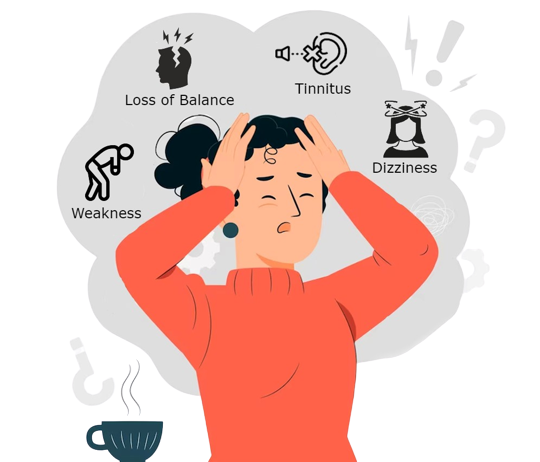
Vertigo is a symptom, rather than condition. Vertigo is a condition where an individual feels like the environment around you is moving or spinning. Vertigo is a sensation that makes an individual feel that they are out...
Vertigo is a symptom, rather than condition.
Vertigo is a condition where an individual feels like the environment around you is moving or spinning.
Vertigo is a sensation that makes an individual feel that they are out of balance and feeling dizzy.
Vertigo is not a disease but a symptom of inner ear problems or vestibular dysfunction.
Patient with vertigo or dizziness is a sensation of lightheadedness, feeling faint and feeling of body imbalance and the patient feels difficulty in staying still or standing.
Attacks of vertigo may develop suddenly and last for a few hours to a few days.
Dizziness is more common in females than males and older people.
People with these signs must consult with a doctor. Doctor will examine and rule out the cause. For best treatment, a doctor may advise you some tests.
What Are the Causes of Vertigo?
There are two type of vertigo-
Peripheral Vertigo
It is caused by abnormal inner ear balance
Central Vertigo
It is caused by the problem in the central nervous system which includes- brain stem vascular disease, arteriovenous malformation, acoustic neuromas and tumours of the brain, multiple sclerosis and vertebrobasilar migraine.
Some of the more common inner ear-related conditions that cause vertigo include -
- Benign paroxysmal positional vertigo- (BPPV)
- In this condition specific movements like looking up or down, sitting up or lying down or rolling cause vertigo.
- BPPV may be caused by an ear infection, ear surgery, head injury or extended bed rest due to illness.
- Labyrinthitis or inner ear infection due to cold or flu
- Inflammation vestibular nerve in the inner ear
- Menire’s disease – it’s a condition that leads to ringing sensation in the ear or hearing loss.
Vertigo related with CNS is caused by-
- Sinusitis
- Migraine
- Multiple sclerosis
- Acoustic neuroma
- Brain tumour
- Brain stroke
- Seizures
- Certain medications
Other causes of vertigo are-
- Hyperventilation
- Bone growth in the middle ear
What Are the Symptoms Associated With Vertigo?

- Dizziness
- Problem focusing the eye
- Hearing loss
- Tinnitus
- Loss of balance
- Nausea and vomiting
- Difficulty in swallowing
- Double or blurred vision
- Eye movement problem
- Slurred speech
- Weakness and uncoordinated limbs
- Facial paralysis
How Do Doctors Diagnose Vertigo?
Firstly a doctor performs a physical examination to identify the associated symptoms of the vertigo. Healthcare providers use delicate instruments to examine the ear and eye movements or ask you for a simple head movement.
Doctor may identify the vertigo as being peripheral or central but the cause of vertigo sometimes cannot be identified, so the doctor may advise you further investigations.
To examine and identify the Peripheral vertigo various diagnostic tests can be advised to detect the cause’s like- peripheral vestibular disorder, sensorial hearing loss and many more. Other tests for peripheral vertigo include hearing test, Dix-Hallpike test, CT inner ear, HRCT inner ear and MRI screening of ear.
Ganesh Diagnostic Offers Wide Range of Diagnostic Test To Identify the Underlying Cause of Vertigo :-
- Blood tests
- Walking (Gait Testing)
- Brainstem auditory evoked potential studies
- Caloric stimulation
- EEG (electroencephalogram)
- X ray skull/ head
- Head CT
- Lumbar puncture
- MRI scan of head
- MRA of blood vessels of the brain
Ganesh Diagnostic and Imaging centre offers Vertigo Protocol to evaluate the cause and confirmation of vertigo.
MRI vertigo protocol includes MRI Brain with CP angle, screening of cervical spine and MRA brain.
VERTIGO PROTOCOL – is a neuroimaging technique that provides a sequence of images of the brain, vestibular system and surrounding structures.
It plays a very crucial role in the diagnosis and management of patients with vestibular abnormalities.
MRI vertigo protocol is preferred over Computed Tomography (CT scan) because it is superior in visualisation of posterior fossa which is often the site of central aetiology of vertigo.
The key to arriving at the diagnosis is to differentiate vertigo from other causes of dizziness or imbalance and distinguish central from peripheral causes of vertigo. An accurate diagnosis is essential in life-threatening causes.
MRI and MRA is the best choice as CT scan is less sensitive than MRI for the diagnosis and evaluation of central lesions.
To know more about Vertigo protocol, click here
When Should You Consult to Doctors?
- Dizziness after head injury specially
- High fever
- Convulsions
- Hearing loss
- Fainting
How to Prevent Vertigo?
- Avoid rapid motion head
- Frequent changes in position
- Minimise stress
- Get enough fluid and healthy diet as Anaemia also causes dizziness
- Treat infection of ear, sinus, cold, flu, congestion and other respiratory infections.
Ms will progressively worse that needs specialised attention and treatment.
If your symptoms get worse or happen more often despite treatment, do visit our Diagnostic centre for better understanding of the disease. Ganesh Diagnostic and Imaging Centre is the right choice for your vertigo testing. You can also consult with our specialist team of doctors, free consultation without any charges. We are open 24*7 and 365 days, without any extra charges. Ganesh Diagnostic and Imaging centre has many branches in different locations in Delhi. This centre is equipped with the latest technologies, modern and highly advanced machines and very Skilled Radiologists and Pathologists to assure quality services to our patients. We also provide facilities for online reporting, Home blood collection and free Ambulance services.
Only facility to execute large diagnostic test menu with 50% discount under one roof- Blood test, Histopathological test, harmone test, Urine and stool examinations, X-Rays, CT Scan, MRI and PET Scan.
Ganesh Diagnostic Centre also operates seven dedicated diagnosyic centre- in Yamuna Vihar, Mangol Puri, Budh Vihar, Model Town, Hari Nagar, Nangloi, Rohini.









